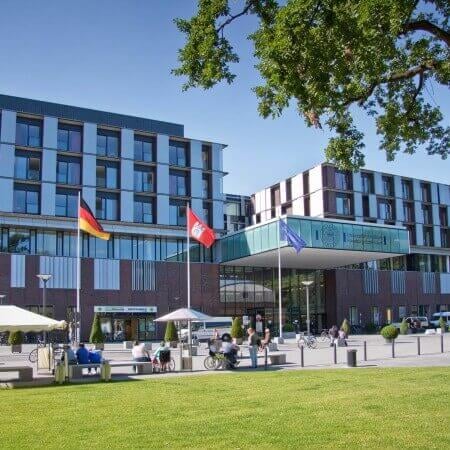Melanoma is the most aggressive skin tumor. It is especially difficult to treat this neoplasm in its advanced stages, after the development of metastases in the lymph nodes or internal organs. Nonetheless, doctors in developed countries successfully cope with treating this skin tumor. Foreign oncologists have in their arsenal the most advanced methods of cancer treatment. They offer not only surgery, radiation therapy, and chemotherapy, but also targeted therapy, various immunotherapy options, adoptive cell technology, isolated limb chemoperfusion, and other methods. You are welcome to use the Booking Health service to make your treatment appointment abroad at a favorable price.
Content
- What surgical interventions can be performed for melanoma?
- Immunotherapy
- Targeted therapy
- Chemotherapy
- Radiation therapy
What surgical interventions can be performed for melanoma?
The main treatment for melanoma is surgery. In the early stages, surgery may be the only method a patient will need.
Excisional biopsy is a surgical procedure performed to diagnose a disease. A doctor removes melanoma completely to send it for a histological examination. If the tumor is large, only a part of it can be removed: such a biopsy is called incisional.
Wide excision is the main operation for melanoma treatment. This usually helps to cure the disease at an early stage, if the tumor has not penetrated deep into the skin. With a high probability of melanoma, based on non-invasive diagnostics, a doctor immediately performs a wide excision, without a biopsy. If there is any doubt, a biopsy is performed first, and after confirming the diagnosis, the doctor performs a second operation, since the tumor must be removed with the involvement of normal skin. The area of skin to be removed depends on the size of the melanoma. After removing the tumor, doctors suture the skin. The wound heals, leaving a scar.
Sometimes melanoma develops in an aesthetically or functionally important area, so the involvement of a significant area of skin is undesirable. For example, if the tumor develops on the face, near the joint, in the genital area, etc. In this case, you can discuss the possibility of a smaller involvement of healthy skin with your doctor. However, such situations require more careful postoperative monitoring, as the likelihood of a recurrence of the disease increases.
Mohs surgery is not used as often for melanoma as it is for skin cancer, but this intervention can sometimes be performed at a very early stage of the disease. This is a complex surgical procedure that requires special training from a surgeon or a dermatologist. Doctors remove the tumor with minimal involvement of healthy skin. They then cut off thin tissue flaps and send them for a histological examination. The flaps continue to be removed only in the direction in which cancer cells are found. In those directions where a resection margin is clean, a wound is not expanded. As a result, doctors manage to remove the tumor with a better aesthetic or functional outcome, since they do not have to resect a large area of normal tissue next to the melanoma.
Amputation is an infrequent surgical procedure for melanoma. This may be required if the tumor has appeared, for example, on a finger or an earlobe.
Lymph node dissection is an operation to remove lymph nodes. Which one depends on the location of the tumor. For example, if melanoma develops in the leg, the doctor will remove the inguinal lymph nodes, since it is there that cancer cells will first get if metastases spread.
Sentinel lymph node biopsy is another option that can be used for melanoma. Lymph node removal surgery is required for most patients. But if you are being treated in one of the countries with highly developed medicine, lymph node dissection can be avoided. Doctors abroad perform a procedure called a sentinel lymph node biopsy. Doctors inject a radioactive substance into the tumor area. With a gamma camera, they check in which lymph nodes the radionuclide has accumulated. These 2-3 nodes will be removed and examined. If there are no signs of cancer, the removal of other lymph nodes does not make any sense. Lymph node dissection is not performed in such patients, which avoids traumatic surgery and associated complications, such as lymphedema.
Metastasis removal may be required with the spread of distant metastases when melanoma cannot be cured with a surgical method. But if there is a small number of tumors, they can be removed to eliminate symptoms and increase a patient's life expectancy.
Immunotherapy
Immunotherapy is considered the second most effective treatment for melanoma after surgery. Some types of treatment help to cure cancer even at its advanced stage. Immunotherapy works better for melanoma than for most other cancers. Healthcare professionals abroad use the following treatment methods:
Immune checkpoint inhibitors "turn off" molecules that help cancer cells to evade attacks from the immune system. Doctors use drugs from the following pharmacological groups:
- PD-1 inhibitors can be prescribed for an inoperable melanoma, and after surgery to remove a stage 2-3 tumor to reduce the risk of a relapse;
- CTLA-4 inhibitors can be used in the same situations, but usually as a second-line drug, because they work worse than PD-1 inhibitors, and, at the same time, cause more side effects;
- PD-L1 inhibitors can often be used in patients with a BRAF gene mutation;
- LAG-3 inhibitors, a new group of immune checkpoint inhibitors, can be combined with PD-1 inhibitors for melanoma.
Interleukin-2 is a drug that stimulates the immune system. In developed countries, it is used less and less: this has been supplanted by more effective and safe immune checkpoint inhibitors. But this medication can be used as a second-line drug if the initial therapy no longer works. In specialized clinics, doctors use intralesional therapy with interleukin-2: the drug is injected directly into the tumor. This procedure reduces the risk of a recurrence of the melanoma that has spread to the lymph nodes.
Oncolytic virus therapy is another treatment option. Doctors abroad use Talimogene laherparepvec (Imlygic, T-VEC), which is injected directly into the tumor, once every 2 weeks. The virus destroys cancer cells and also stimulates the immune response. As a result, not only the size of the primary tumor shrinks, but also of all metastases.
BCG is a less effective, but inexpensive treatment method. The BCG vaccine is injected into the tumor in stage 3 melanoma to activate the immune system.
Imiquimod cream is a treatment option for stage 0 melanoma. This can also be used to suppress tumor metastases to the skin. The cream is applied to the tumor 2 to 5 times a day for up to 3 months. This can cure early-stage melanoma by boosting the immune attack on the tumor.
Here are some innovative methods of immunotherapy that are not widely used, but are already offered in specialized centers or are in the final phases of clinical trials:
Cancer vaccines are an innovative treatment option. Doctors are researching several therapeutic vaccines that boost the immune response against the tumor.
Immunotherapy according to the TIL protocol can be used for stage 4 melanoma. This therapy is usually combined with chemotherapy and radiation therapy. Doctors take lymphocytes directly from the tumor (tumor-infiltrating lymphocytes), select the most aggressive of them, multiply them, and inject them into a patient's body. The process takes about 6 weeks, as doctors must obtain at least 1 billion cells. The procedure is successful in 50% of patients. Moreover, in 20% of cases, it is possible to achieve a complete response to treatment: the tumor and metastases disappear completely.
CAR T-cell therapy can be used for stage 4 melanoma. Doctors take a patient's immune cells, modify them, multiply them, and inject them into the body. These cells attack the tumor and its metastases. If successful, it is possible to achieve the disappearance of all tumors, a long-term remission, or even a complete cure for melanoma. This is a very effective way to fight cancer, but its widespread use has so far been held back by a high cost of treatment.
Targeted therapy
In the advanced stages of melanoma, doctors use targeted therapy. They prescribe the following drugs:
BRAF inhibitors can be used in patients with BRAF gene mutations. They are used in stage 3 to reduce the risk of cancer recurrence after surgery, and also in stage 4 to control tumor growth and increase a patient's life expectancy.
MEK inhibitors are used for melanoma that cannot be removed with surgery, including at the advanced stage. These drugs may also be given after stage 3 tumor surgery, along with BRAF inhibitors. These medicines work better together than they do alone.
Tyrosine kinase inhibitors can be used in patients with C-KIT gene mutations. Such melanomas often develop in the mouth, on the mucous membranes, on the soles, palms, or in areas of constant exposure to sunlight. Before prescribing this group of drugs, doctors check the tumor for mutations.
Chemotherapy
Classical systemic chemotherapy for melanoma can rarely be used. This is because immunotherapy and targeted therapy work much better. Therefore, cytostatics are used only when other treatments can no longer control tumor growth.
Isolated limb perfusion (ILP) is also used in developed countries. Doctors perform a minor operation to connect the arteries of the limb where the tumor is located to a machine that circulates blood. The blood is mixed with high doses of chemotherapy drugs. After the procedure, the blood vessels will be reconnected back to the patient's arteries.
Radiation therapy
Radiation is the main treatment option for most types of cancer, but this can rarely be used for melanoma. Doctors use radiation therapy in the following cases:
- for treating early-stage melanoma, if surgery is contraindicated;
- after surgery for removing desmoplastic melanoma, which is very rare;
- for irradiating a lymph node basin after lymph node removal surgery, if many of the lymph nodes were affected by metastases, based on the results of a histological examination;
- for destroying a recurrent tumor;
- for a local control of metastases at the advanced stage of the disease.
You can undergo your diagnostics and treatment for melanoma with modern methods in one of the developed countries. You are welcome to make your appointment for diagnostics and treatment through the Booking Health service. You can compare the cost of treatment in different clinics to take advantage of the best offer. The Booking Health specialists will help you to choose a clinic and organize your trip.
Authors:
The article was edited by medical experts, board certified doctors Dr. Nadezhda Ivanisova and Dr. Sergey Pashchenko. For the treatment of the conditions referred to in the article, you must consult a doctor; the information in the article is not intended for self-medication!
Sources:
National Cancer Institute
Cancer Research Institute
MedicineNet




















